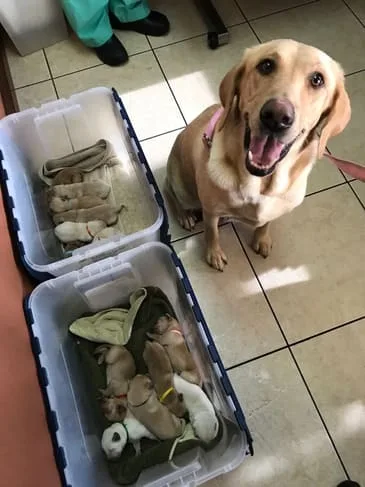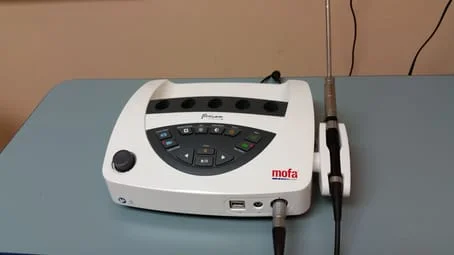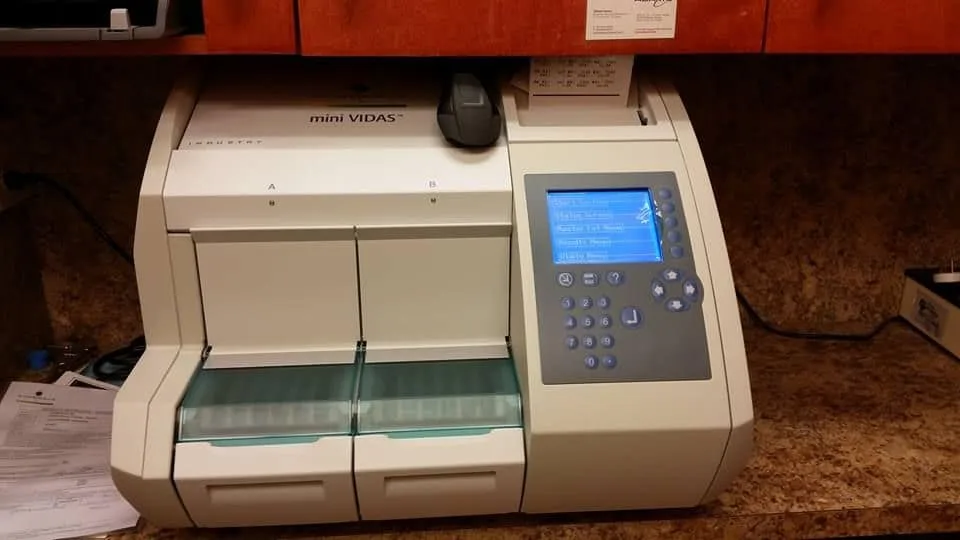Like humans, dogs can have problems to become pregnant and conceive and produce puppies. Since their reproductive system and their reproductive life is shorter than humans, it makes it more imperative to address the cause of the problem. At QCAH we perform blood tests, ultrasound, artificial insemination (trans-vaginal and surgical), ovulation timing test (we have the most accurate in-house progesterone machine), frozen semen surgical insemination and TCI (trans-cervical insemination). Dr. Mendez has special interest in Canine Reproduction and he attended several courses and hands-on labs. in the US and several other countries. He has experience working with English Bulldogs and French Bulldogs breeds known to be difficult to reproduce.

Molly and her 14 puppies. The owner followed Dr. Mendez's recommendations throughout the heat cycle, and in turn, got 14 healthy puppies!!!

Transcervical Camera Insemination

Happy to announce our In-House Progesterone machine. We can now provide progesterone results in less then one and a half hour.
Reproduction FAQ
One of Our special Interest area is Canine Reproduction. Dr.
Mendez has been actively involved in Canine Reproduction for many years as a
Veterinarian, breeder and Exhibitor. This gives him a unique extra
experience. There is much information
about this topic out there (online, friends, "experienced breeders",
etc.) But many of them are inaccurate.
Based in our experience, Education and success, we want to share some commonly
asked questions to better understand this matter.
-When is the best
time to breed my dog/bitch?
Dogs usually reach their sexual maturity after 1 year old.
There is some variation based on size and breed (larger breeds mature a little
bit later and smaller breeds a little bit earlier).
Bitches also reach their sexual maturity after 1 year old,
even though they can start heat cycles by 9-11 months of age, but it's not
recommended to do it at this time. The heat cycle period is every 6 months in
average (with a range of 5-9 months).
The general rule is to start breeding after the sexual
maturity.
-I decided to breed
my bitch. How do i start?
First, it is recommended to do a Physical exam and blood and
urine test, if it's needed. This allows us to identify any condition that is
important for the breeding purposes.
Also in Males, it's important to do a Physical exam to identify any
abnormality and blood, urine and semen test, if it's needed.
- There is a test
that tells you when is the best time to breed ?
In females, the heat cycle last for 2 weeks in average (with
a range of 9-28 days). The first half is called Pro-estrous and the second half
is called Estrous. At the end of
Pro-estrous (about day 6 or 7 of heat cycle) we recommend to start running the first
Progesterone test. This is a blood test that measures the levels of this
hormone. Progesterone levels start to increase while the bitch is going into
Ovulation time. Also we evaluate the cells of the vaginal tract with a Cytology
and the vaginal tissue by a speculum.
There is also another blood test, the LH test. This is the hormone that
starts the ovulation process. The problem with this hormone is that it increase
and decrease levels within 24 hours, making it impractical to obtain a positive
value.We use this test in certain cases like insemination with frozen semen,
where you need to be very accurate. We are happy to announce that we have now
our own in house Progesterone equipment,
which tell us results in 45 minutes. This
make a big difference in Ovulation management.
-And how many
Progesterone test do i need to do?
Depending on the type of Heat cycle. On a bitch with regular
Cycle, up to 3 or 4 tests may be enough.
On a bitch with irregular Cycle, more tests might be needed. There are special situations where the bitch
started to increase the Progesterone level and they"stall" at certain
value. That make it more difficult and more progesterone tests will be needed.
-At what number of
Progesterone is my bitch ovulating???
There is not a “magic number” or value of Progesterone to
tell that she ovulated. Ovulation can occur with values of Progesterone between
4-10 ng/dl. The idea is to detect the progression of Progesterone values. It is
estimated that ovulation occurs with Progesterone around 5ng/dl but it’s not
always true.
-How many times do I
need to breed or inseminate my bitch??
It all depends with the ovulation timing, schedule and
quality of semen. In our experience, 1 or 2 inseminations should be enough, if
we did a good timing and the quality of semen is OK. There are some occasions
(like weekends, holidays or long weekends) that we need an extra insemination.
When the quality/concentration of semen it’s not the best we
can always process it and improve the sample. We have available the TCI
endoscopy system that allow us to work with very small amount of semen.
-After insemination,
when can I know if she is pregnant??
At 3 ½ -4 weeks after insemination, we do Ultrasound to
confirm pregnancy. At 7 or 8 weeks of
pregnancy we do Radiographs to determine how many puppies we have and if the
size of litter and mother are OK to have a regular delivery. If the case is
needed, we can monitor pregnancy more often.
-How can I know if my
bitch will deliver the puppies naturally or might need C-section??
Certain breeds known as Braquicephalic (like Bulldogs,
French bulldogs, Boxer, etc) have some anatomic conditions that require C-sections.
But also, large breeds with large number of puppies are recommended to have
C-section due to stress and being unable to finish the delivery of all puppies.
Also very small breeds (like Yorkies, Chihuahuas, malteses, etc.) with either
singleton or more than 4 or 5 puppies, are recommended a C-section. For all
this reasons, we strongly recommend Radiographs at 7 or 8 weeks of pregnancy.
-What are the signs
that I need to look in my Bitch to see if she is ready to deliver her puppies?
The first sign is the Body Temperature. Normal rectal
temperature in the Bitch is 101-102 F degrees.
12 to 24 hours previous at onset of whelping the temperature drops to 98
– 98.5 F degrees and then temperature thereafter begins to rise as the bitch
enter stage I labor.When this stage starts, the clinical signs of anorexia,
restlessness, apprehension, panting, shivering and occasional vomiting are
present. For this reasons, we recommend to start taking temperature 4 to 5 days
prior the expected date of whelping.
-How can I tell if
there are complications in the delivery process?
Once the mother start on the stage 2 of labor (having abdominal contractions, pushing, etc.) and no
puppies are coming after 20 or 30 minutes or when the time between puppies
exceeds more than 2 or 3 hours, it’s time to see Veterinary assistance. This
time is critical to have good and successful parturition.
Also after birth, the mother should be able to assist and
stimulate the newborns. If she doesn’t do it, the owner has to dry, clean and
remove the excess of fluids from the puppies
mouth and nostrils. You can always contact us for information.
-How I know if my
Bitch is done with the parturition?
That’s why we highly
recommend previous radio graphs. Usually the bitch that finish the process is
quiet, calm, sleeps, has no more contractions, attends her litter, etc. But if no radio graphs were done, it is good
idea to have her examined by a Veterinarian to confirm that no more puppies are
present.
